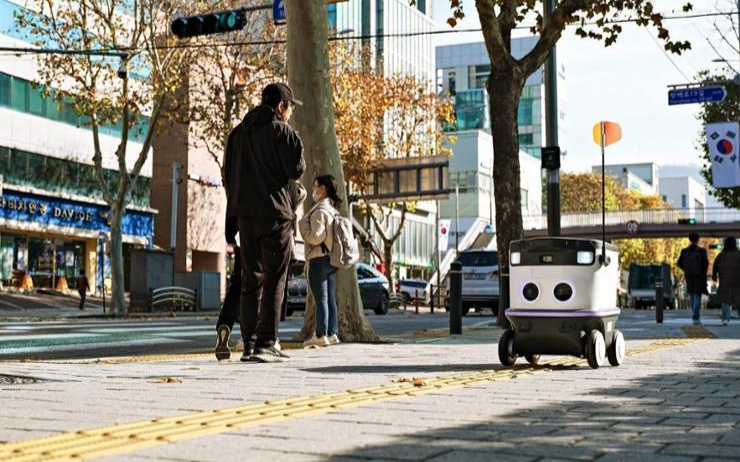Delivery robots set to become ubiquitous in Korea

Neubility’s Neubie delivery robot delivers goods in Seoul in this undated file photo. Courtesy of Neubility
Eased government regulations allow firms to operate robots on streets
By Park Jae-hyuk
Starting in August, consumers placing delivery orders in Seongnam, Gyeonggi Province, might encounter robots waiting at their doors with the packages they purchased.
Neubility, a Korean autonomous robotics startup, said Monday that it joined hands with the city government to run 10 Neubie delivery robots near Pangyo Station and Seohyeon-dong, following eased regulations on using delivery robots outdoors.
The project is aimed at helping mom-and-pop store owners cut down on delivery costs. The company received 300 million won ($221,000) in funding from the central government and an additional 130 million won from other investors for the project.
“Following the central government’s deregulatory measures, we were able to start our robot delivery service in earnest in Seongnam,” Neubility CEO Lee Sang-min said.
The outdoor robot delivery service has been legal in Korea since last November, as the revised Act on Development and Supply of Intelligent Robots allows the autonomous operation of robots outdoors for deliveries, while the revised Road Traffic Act categorizes delivery robots as pedestrians that can move on sidewalks.
The eased regulations have prompted multiple robotics firms here to bring their delivery robots out of buildings, aiming to assess their capabilities in outdoor service.
In collaboration with KT and Gangnam District Office, Neubility tested its Neubie robots last November, delivering beverages to customers who placed orders near Seolleung Station via the company’s mobile app.

An office worker checks the goods delivered by Woowa Brothers’ Dilly delivery robot in Seoul in this November 2023 photo. Courtesy of Woowa Brothers
Woowa Brothers, the operator of the Baedal Minjok delivery app, also tested its robot, Dilly, for outdoor service near COEX.
“Equipped with advanced cameras and sensors, Dilly can swiftly and precisely detect obstacles while operating in densely populated downtown areas,” a Woowa Brothers official said. “The robot is equipped with a high-performance self-driving algorithm, which allows it to avoid pedestrians on crowded sidewalks and find a new route immediately in unexpected situations.”
Robotis, which previously operated its Gaemi delivery robots in restricted outdoor environments such as apartment complexes, camping grounds, resorts, and golf courses, is now advancing to street deliveries of beverages within this year in collaboration with Vanada Coffee, a local coffee shop franchise.
According to market intelligence company Quad Intel, the global outdoor delivery robot market is projected to surge in size to $105 million by 2027 from $4 million in 2020. That forecast reflects an average annual growth rate of 17.3 percent.
“The usage of outdoor delivery robots is expected to reduce the overall cost of labor to a great extent,” Quad Intel said in a report. “These robots can substitute a delivery person and can carry a payload of more than 100 kilograms in one go.”
However, it warned that robots can result in traffic accidents and hurt pedestrians.
“The outdoor delivery robots are also attracting criticism, as robots would compete with pedestrians and wheelchairs for space,” Quad Intel said.
Amid escalating concerns regarding potential accidents involving delivery robots ahead of their widespread adoption, the National Police Agency has initiated a study on how to address such incidents and determine liability for damage.



